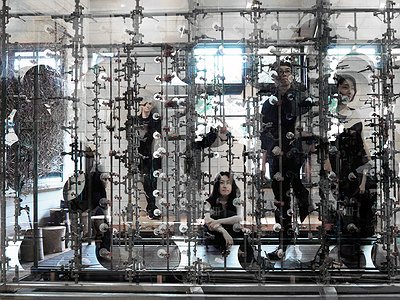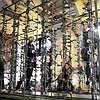Part 1
Name: Anoice
Members: Tadashi Yoshikawa, Takahiro Kido, Utaka Fujiwara, Yuki Murata
Interviewee: Takahiro Kido
Occupation: Composer, guitarist
Nationality: Japanese
Current release: Anoice will release their new album The Hidden Forest on their own imprint, Ricco Label, on September 17th 2021.
Recommendations: Here are two works I was influenced by before I decided to be a musician. The first is 'Tower of the Sun' that is a building in my birth town, Osaka, created by Japanese artist Taro Okamoto. I used to be too scared to see it in my childhood. The second is 'Lemon', is a collection of short stories by Japanese author Motojiro Kajii. I could feel sounds, colours, and smells from his words.
If you enjoyed this interview with Takahiro Kido and would like to know more about his work, visit his excellent, informative website. Anoice is represented on Instagram, Facebook, Soundcloud, twitter, and bandcamp.
When did you start writing/producing music - and what or who were your early passions and influences? What was it about music and/or sound that drew you to it?
I started writing/producing music in 2004, when I came to Tokyo from my birth town, Osaka, with the idea of composing music, and soon recruited the band members of my first band, Anoice. However, the other music composer of Anoice, Yuki Murata had started composing music when she was 2 years old.
My early influences were classical music such as Claude Debussy and Ludwig van Beethoven, rock music such as The Clash and Mogwai, and jazz music such as John Coltrane and Bill Evans. But the most influential artist for me may be Yuki since I became a musician.
In the first year, I had just been enjoying improvisation playing together with Anoice members in the studio or sometimes in the forest, street, park, and the ruins of a hotel, and also recording them. I was just dying to create something special and didn't need a special motive.
For most artists, originality is preceded by a phase of learning and, often, emulating others. What was this like for you: How would you describe your own development as an artist and the transition towards your own voice?
Anoice is the first band for each member, but we have not covered or emulated other artists as a band, because we wanted to create and release our own album as soon as possible. In addition, I personally have not studied how to create music, how to play instruments, and especially how to record the instruments and mix them, so I didn't have any skills. I recently listened back to some of our early works for the first time in a while. They were very strange and not organised, but not bad. It's an imperfection, but very interesting.
As far as the current state of originality of mine and ours, I think I would establish it on Anoice's third album 'The Black Rain' in 2012 through trial and error.
After we released Anoice's first album 'Remmings' in 2006, we also started on our own solo projects such as Takahiro Kido and Yuki Murata, as well as side projects such as RiLF, Films, Mizu Amane , Mokyow, and Cru.
In addition to this, I began composing music for movies, TV shows, and commercial adverts in 2009. During this period, I had the experience of trying to compose various types of music. I think that this experience had a positive effect on me finding my own musical originality and understanding the way to compose and produce my original neo-classical-rock-ambient-sometimes-pop-electric music which I'm producing now.
How do you feel your sense of identity influences your creativity?
It has never crossed my mind, but I think the complex system of Japan’s untouched nature may be in my genes. One of Japan’s traditional styles of music, Gagaku, has melodies and structures which are difficult to understand, but almost all of the songs express nature such as the forest, rain, and wind. Unfortunately, most of the deep forests have been lost, but I can always feel them in my mind.
The work most influenced by nature is Anoice's new album 'The Hidden Forest' which was partially recorded in a foggy forest, or sometimes in a dark forest in middle of the night, or sometimes in a forest where a strong wind blew.
What were your main creative challenges in the beginning and how have they changed over time?
To establish my own originality. As I mentioned, I found one of the ways when we released Anoice's third album 'The Black Rain', but now I’m at the stage where I'm changing it gradually. I'm always looking for new way to create new music that nobody have has heard before.
As creative goals and technical abilities change, so does the need for different tools of expression, be it instruments, software tools or recording equipment. Can you describe this path for you, starting from your first studio/first instrument? What motivated some of the choices you made in terms of instruments/tools/equipment over the years?
Firstly when I started music in 2004, I chose an electric guitar and a piano as my main instruments for composing music, and purchased an iBook G4 with OS 10.5 and Digital Performer 5 as my DAW. I had no choice other than creating music on digital equipments because it was so difficult for me to purchase analog systems. I tried other DAW softwares such as Pro Tools and Logic Pro, but Digital Performer 10 is a main software in our studio now together with some audio interfaces from Antelope and MOTU and my favorite microphone preamps from Solid State Logic, Focusrite, Rupert Neve Designs, and so on.
Me and members of Anoice have a lot of instruments in our studio; three grand pianos, one upright piano, three guitars, organ, celesta, violin, viola, cello, and various kind of percussions, but I keep in mind to record them without any additional tastes. And, this combination of recording equipments goes well with my style for creating music, I think.
Of course, I also often use virtual instruments, but I still like an old analog synthesizer produced by YAMAHA, KORG, and MOOG, and also love to use a Compact Cassette and a MiniDisc as recorders. As for the post recording process, I usually use both of digital/analog equipments. Anyway, I like any instruments and equipments. Now, Yuki is enthralled by making her original music box, so it may feature on either her solo album or Anoice's forthcoming new album.
Have there been technologies or instruments which have profoundly changed or even questioned the way you make music?
Yes. I was really surprised by some audio plugins which work automatically such as ones produced by iZotope, Waves Audio, and Sonible. Thanks to them, I’ve been able to create music in a shorter time than before, but of course something important is lost in the process, especially an artist's unique atmosphere. So, I always cherish deciding my favourite sound by myself even if it sounds cheap and dirty for music listeners.
Collaborations can take on many forms. What role do they play in your approach and what are your preferred ways of engaging with other creatives through, for example, file sharing, jamming or just talking about ideas?
Collaborations with guest instrumentalists including not only string, wind, and percussion players but also vocalists are important for me to add their unique originalities. Also, their professional skills and knowledge for playing the instruments are the biggest help for music I aim for. I can compose my own music, but I don't understand in detail about how to play some of the instruments I want to use. So, I'm always inspired by their performances and come up with new ideas for composing music.
As for ways of talking music with them, I prefer to meet and talk with them directly while listening to the demos and checking sheet music in our studio on the recording day. I believe in their talents and originality, so I don't ask them about how to play much. When Yuki and I recorded a collaboration album together with 30-piece orchestra in Moscow two years ago, it took a lot of time for us to grasp their individuality.
However, if I can understand and believe in them, that is enough for me.
Take us through a day in your life, from a possible morning routine through to your work, please. Do you have a fixed schedule? How do music and other aspects of your life feed back into each other - do you separate them or instead try to make them blend seamlessly?
Very simple. I wake up at about eight o'clock, make a cup of coffee, and go cycling for about five hours. There is a forest and lake around my house and in/near my town. After lunch, I go back to my house, take a shower, and then nap for about two hours. Once I’ve woken up, I start to work at least until I get bored with it. I usually compose music during that time, but sometimes I have to office work for my own music label, Ricco Label.
When I don't have any urgent business, I climb a mountain and sometimes camp in a remote area with not people or internet. Nature is important for me in getting a good idea for composing music. I always think of the melodies and the instrument formations in my head in a quiet space, but sometimes the nature sounds such as birds, owls, insects, wind, river, and squeaking trees give me a good idea unexpectedly. I often work as an art designer for my label's releases, so I always carry my camera with me since it would be useful for the art works for forthcoming new releases.






